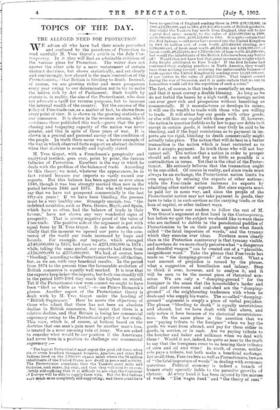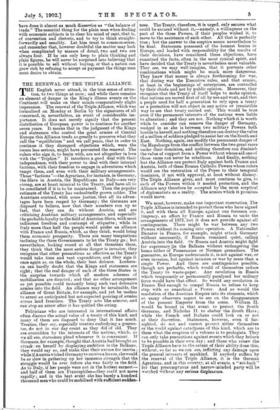TOPICS OF THE DAY.
THE ALLEGED NEED FOR PROTECTION.
WE advise all who have had their minds perturbed and confused by the paradoxes of Protection to read carefully M. Yves Guyot's article in the July Con- temporary. In it they will find an admirable criticism of the various pleas for Protection. The writer does not answer the other side by a mere restatement of certain abstract doctrines, but shows statistically, and yet clearly and convincingly, how absurd is the main contention of the Protectionists,—that Britain is bleeding to death. Instead, of course, we are growing richer and more prosperous every year owing to our determination not to try to make the nation rich by Act of Parliament. Such wealth by statute is, in reality, the aim of the Protectionist, who does not advocate a tariff for revenue purposes, but to increase the internal wealth of the country. Yet the success of the policy of Free-trade can, as a matter of fact, be shown from every point of view. It is shown in the growing statistics of our commerce. It is shown in the revenue returns, which —witness those published this week—prove that the pur- chasing and taxpaying capacity of the nation was never greater, and this in spite of three years of war. It is shown in a general and personal survey of the condition of the people. In truth there never was a better example of the way in which observed facts support an abstract doctrine when that doctrine is soundly and logically stated.
M. Yves Guyot, with a Frenchman's perspicuity and analytical instinct, goes over, point by point, the various fallacies of Protection. Excellent is the way in which he deals with the problem of the balance of trade. 'According to this theory, we nuist, whatever the appearances, be in fact ruined because our imports so vastly exceed our exports. But this balance has been against us ever since 1846, though it was less strongly marked than now in the period between 1846 and 1875. But who will venture to say that we have not prospered commercially in the last fifty-six years ? If we have been bleeding, the process must be a very healthy one. Strangely enough, too, "the indebted countries, such as Peru, Greece, Hayti, and Spain, Which have so often had the balance of trade in their favour," have not shown any very wonderful signs of prosperity. That is strong negative proof of the value of Free-trade. The positive side of the argument is put with equal force by M. Yves Guyot. It can be shown statis- tically that the moment we opened our ports to the com- merce of the world our trade increased by leaps and bounds. For example, our imports, which averaged £146,000,000 in 1855, had risen to £291,000,000 in 1874; while, taking the same period, our exports had risen from £116,000,000 to £235,000,000. We had, of course, been " bleeding," according to the Protectionist theory, all the time, but., as We see, with very beneficial results. In the period from 1874 to the present time the favourable evolution of BritiSh commerce is equally well marked. It is true that the exports keep below the imports, but both rise steadily till in the period 1899-1901 they reach the highest on .record. Yet if the Protectionist view were correct we ought to have been "bled as white as veal,"—to use Prince Bismarck's phrase. Another aspect of the Protectionist theory is dealt with by M. Yves Guyot under the heading of "British Supremacy." Here be meets the objections of those who admit that there has not been an absolute decline in British commerce, but insist that there is a relative decline, and that Britain is losing her commercial supremacy owing to the Protectionist policy of her rivals. This view, which is, of course, at bottom based on the doctrine that one man's gain must be another man's loss, is treated in a most amusing vein of irony. We are asked to consider what would be our position if the Americans had never been in a position to challenge our commercial supremacy :— "The logical Protectionist must regret the good old times when sir or seven hundred thousand Iroquois, Apaches, and other Red Indians lived on the 2.939,000 square miles where the 76 million inhabitants of the United States. now dwell in Peace and Activity. The Protectionist complains that the Yankees erect mills and factories; sink mines, lay rails, and that they will soon he so corn- ■ letely self-sufficing that it is difficult to see what the Continent of Europe will be able to supply them with. But the Red Indians ere much more completely self-supporting; and there could have been no question of England sending them in 1899 £18,119,000, ire 1000.C19,781,000, and in 1901 £18,401,000 worth of British products. But whilst the Yankees buy much from England, they sell to her a great deal more--namely, to the value of £120,081,000 in 189S, .:.'136,789,000 in 1900, .2140,454,000 in 1901. It is quite certain that I he Red Indians would never have poured into the United Kingdom in 1901 40 million cwt. of corn worth £13,400,000 sterling, nor 3,180,000 cwt. of fresh meat worth £6,701,000, nor 4,244,000 cwt. of bacon worth .£9,255,000, nor 1,730,000 cwt. of ham worth £4,209,000; but would the inhabitants of the British Isles have been any better off ? Would they not have lost that great increase in weight which John Bright attributed to Free Trade? If the Bed Indians had- continued their scalping practices in North America, they would have done nothinr, towards restoring the unfavourable balance of trade against the United Kingdom by sending over 13,221,000 cwt. of raw cotton to the value of £32,335,000. That import ceased during the war of Secession, and it is quite certain that no one in Lancashire would call for the repetition of such a crisis."
The fact, of course, is that trade is essentially an exchange, and that it must convey a double blessing. As long as we do not forbid the banns by a high tariff, no foreign nation can ever grow rich and prosperous without benefiting. us commercially. If it manufactures or develops its mines, it will use its wealth to trade with those who are willing to trade. It will either buy our goods with other goods, or else will hire our capital with those goods. If, however, the nation in question forbids us by law to pay our debts to it except in certain goods, it indeed may truly be said to be bleeding, and if the legal restrictions as to payment in im- ports are too rigid, bleeding to death commercially might actually take place. The nation that will do best in a barter transaction is the nation which is least restricted as to how it accepts payment. In truth those who will not buy cannot sell. The notion that a nation in order to prosper should sell as much and buy as little as possible is a contradiction in terms. Yet that is the ideal of the Protec- tionist. He seriously believes that the transaction ought to be one-sided. Of course in reality, and since trade must always be an exchange, the Protectionist nation limits its own exports by refusing the exports of other nations ; while the Free-trade nation increases its exports by admitting other nations' exports. But since exports must be paid for in some way, and since the people of the Protectionist nation may not take payment in goods, they have to take it in such services as the carrying trade, or-the loan of capital, or other indirect ways.
We must leave our readers to follow the rest of M. Yves Guyot's argument at first hand in the Contemporary, but before we quit the subject we should like to warn those who are inclined to dabble in the paradoxical puddles of Protectionism to be on their guard against what South called "the fatal imposture of words," and the tyranny which they exercise over ideas. Nowhere more clearly than in the Protection controversy is that tyranny visible, and nowhere do we more clearly perceive what "a dangerous and dreadful weapon" can be created out of a "plausible, insignificant word." Take the phrase that Free-trade has made us "the dumping-ground" of the world. What a vast amount of prejudice is roused by the phrase, what a suggestion of humiliation and infamy. Stop to think it over, however, and to analyse it, and it will be seen to be the merest piece of rhetorical non- sense. We are only a " dumping-ground " for the foreigner in the sense that the householder's larder and cellar and store-room and coal-shed are the " dumping- round" of the neighbouring tradesmen with whom he deals and who supply his wants. The so-called " dumping- ground " argument is simply a piece of verbal prejudice. The phrase "bleeding to death" is equally meretricious and absurd, but we have dealt with that above, and only notice it here because of its rhetorical meretricious- ness. On the same plane is the assertion that we are "paying tribute to the foreigner" when we buy the goods we want from abroad, and pay for them either in goods, in service, or in cash. Are we paying tribute to the butcher and baker and milk-man when we deal with them ? Would it not, indeed, be quite as near to the truth to say that the foreigners come to us bearing their tributes of corn and oil and- wine ? In truth, of course, neither side pays a tribute, but both make a beneficial exchange. Let us all, then, Free-traders as well as Protectionists, beware of " the fatal imposture of words" in dealing with economic questions. Political economy is. indeed a branch of human study specially liable to the parasitic growths of rhetoric. At every hand it has been injured by the misuse of words. "The *ages fund" and "the theory of rent" have done it almost as much disservice as "the balance of trade." The essential thing for the plain man when dealing with economic subjects is to clear his mind of cant, that is, of convention and rhetoric, and to try to think straight- forwardly and sensibly. Let him trust to contmon-sense, and remember that, however doubtful the matter may look when complicated by masses of detail, two and two are always four. If he can only keep to plain thinking and plain figures, he will never be surprised into believing that it is possible to sell without buying, or that a nation can grow rich by refusing to accept as payment the things men most desire to obtain.















































 Previous page
Previous page